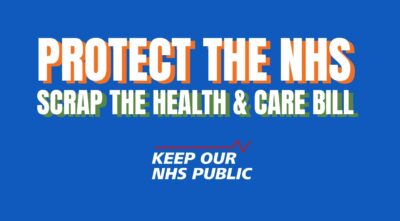
The new NHS bill in committee stage from September has been wrongly spun as a bill to limit privatisation and to promote integration. It does neither of these things but carries significant dangers for the NHS workforce that must be tackled and countered.
The Health and Care Bill is currently passing through Parliament and is due to have its Committee stage and third reading when Parliament returns from its summer recess. Although it was initially believed that the Bill would focus on the future structure and legal status of Integrated Care Systems (ICSs), it goes well beyond this, for example creating many new powers for government and reducing local accountability.
The implications of the Bill for NHS staff are not explicit: the devil is in the detail and from what we already know about the general direction of travel suggested by the government’s White Paper, previous NHS England (NHSE) publications, including its recent consultation on legislative proposals.
A ‘flexible’ (or malleable) workforce
What emerged before publication of the Bill suggests that ICSs will play an increasingly important role in reshaping the NHS workforce. For example, NHSE’s proposals for legislative change suggest the creation of new employment models including
“… workforce sharing arrangements and passporting or accreditation systems that enable their workforce to be deployed at different sites and organisations across (and beyond) the system [ICS], and sharing practical tools to support agile and flexible working”.
This approach is clarified in NHSE’s People Plan for 2020/21, which calls for ICSs to play a bigger role deploying staff effectively across organisations and geographies to meet service requirements, “using workforce sharing agreements that enable the rapid transfer of staff”. Similarly, NHSE's Design Framework (June 2021) calls for each ICS to develop new ways of working “that optimise staff skills, technology and wider innovation to meet population health needs” that will be “enabled by inclusive employment models, workforce sharing arrangements and passporting or accreditation systems." Significantly, these arrangements will entail sharing individual HR records between NHS organisations within or beyond an ICS.
The government White Paper suggested that this flexible working would bring positive changes for both employers and staff. But the ‘flexible working’ envisaged would require NHS staff to move as required, and in some instances rapidly, to different organisations and locations. This could prove highly disruptive for individuals’ working and personal lives, especially bearing in mind the large geographical area most ICSs will cover.
Nor was there any sense of concern that the lack of a stable workforce in any location could not only be hugely stressful but create a barrier to the kind of team building that is fundamental to good patient care and work satisfaction. It’s also a matter of concern that the kind of workforce flexibility expected could serve to undermine effective trade union work and so, over time, pose an indirect threat to employment terms and conditions.
The Health and Care Bill does not explicitly refer to these new ways of working. Where the Bill does mention the workforce, it largely focuses on workforce planning. Even then, despite the staffing crisis, it does little more than require the Secretary of State for Health to publish a report (at least every five years) describing the system in place for meeting the needs of the workforce.
Professional regulation
What the Bill does include are provisions for deregulation of the professions. And despite a recommendation from NHSE (and in contrast to the Health and Social Care Act of 2012 that ostensibly put clinicians at the centre of planning services), there is no statutory requirement in the Bill for a seat on each ICS Board for a medical or nursing representative. This absence seems consistent with the Bill’s focus on professional deregulation.
The Bill gives powers to the Secretary of State for Health to use secondary legislation to remove a healthcare profession from regulation, and abolish the regulatory body for that profession. One of the stated objectives behind this move, outlined in the policy paper Health Care Bill: professional regulation is to support the development of a flexible workforce, allowing a more ‘flexible’ regulatory framework that will enable
“the regulation of groups of workers concerned with physical or mental health of individuals, whether or not they are generally regarded as a profession, such as senior managers and leaders” (our emphasis).
One interpretation of this new regulatory framework is that it will serve to destabilise existing professional categories and potentially weaken the more powerful professions, such as medicine. It could also ease the way to the greater use of staff, such as nursing and physician associates, who have lower levels of competence than the professionals they may replace.
At the same time, the Bill appears to follow the White Paper’s suggestion that
“… over time and with changing technology the risk profile of a given profession may change and while regulation may be necessary now to protect the public, this may not be the case in the future.” (page 63)
The assumption is that the growth of Artificial Intelligence and the use of algorithms to make clinical decisions will decrease risk – even though these technologies are vulnerable to malfunction, human error and bias.
“The landscape of the health and social care workforce is not static, and risks will change over time as practices, technology and roles develop. … over time the risk profile may change, such that statutory regulation is no longer necessary.” (page 64)
Deregulation plus a growing dependence on decision-making technologies seem likely to undermine professional autonomy and pave the way for down-skilling: the more clinical judgment is replaced by algorithms, the more staff employed on lower pay bands will be expected to take on what have been higher-banded responsibilities, whether or not they have the appropriate skills and training. Without those clinical skills, staff may be unable to recognise whether an algorithm is providing an appropriate answer, let alone be able to cope if IT fails in an emergency, with all the implications this suggests for patient safety. Well, at least the pay bill will be lower!
Pay, terms and conditions
NHSE has made an employment commitment for NHS staff working who are directly affected by the legislative changes and the transition to statutory ICSs and who work below Board level (including those within CCGs, NHS England and NHS providers). The commitment is for continuity of terms and conditions to ensure that employees can ‘lift and shift’ from one organisation to another with minimal change.
However the commitment does not appear to be long-term: it’s there to provide stability “during the transition period”, particularly before the establishment of the statutory ICS” (original emphasis). Furthermore, employees are expected to transfer by TUPE from CCG to the ICS Board (or under similar arrangements for the wider public sector). TUPE does not guarantee job security or terms and conditions over time: staff can be dismissed or their terms and conditions altered if the new employer experiences economic, technical or organisational change.
Insecurity for staff is also implied by Schedule 2 of the Bill, which requires each of the 42 ICSs to draw up its own constitution (to be approved by NHSE), setting out how an ICS Board (ICB) will carry out its functions, including how the terms and conditions of its employees will be determined (our emphasis).
Rachael Maskell (MP) picked up this point during the Bill’s second reading, apparently referring to provisions for the transfer of staff when CCGs are abolished. She expressed concern that the proposed legislation would allow an ICS to alter the terms of Agenda for Change (AfC), the national framework for ensuring equal pay for equal work for NHS staff. The Minister of Health (Edward Argar) responded by saying “that it was not the intention that ICBs depart from Agenda for Change” (our emphasis), so side stepping the question of whether AfC could be undermined by an ICS, whether or not it was the government’s intention.
Additional concern comes from the Bill’s endorsement of a new NHS Payment Scheme (section 66) involving new financial flows and contracted payment mechanisms. In deciding the budget for each ICS, NHSE considers the cost of treatments and services they expect will be delivered over the coming year. But now, the national tariff that sets those prices is to be replaced by a new payment scheme, negotiated by local commissioners, (Health and Care Bill Explanatory notes, p15, para 27) in which the price will vary according to where, by whom, and to whom the service or treatment is given. This will mean each ICS has different costs, based on local characteristics, providers and population (with the private sector consulted on the details). We believe that this variability could, over time, help to undermine the concept of national pay, terms and conditions.
Each ICB will have a specific and strictly controlled block budget based on the ICS’s characteristics and will be under huge pressure to cut costs to remain within this. Of course, staff costs are the biggest single outgoing for any NHS organisation (44.9% of the NHS budget in 2016/17) and we have already witnessed how a cartel of NHS Trusts in South West England attempted to move away from AfC to drive down pay, terms and conditions on the basis of getting ‘best value for money’, reversed by protests. Given the new Payment Scheme and the economic pressure that each ICS will be under, it’s possible that ICBs will want to use their power to determine employees’ terms and bring in local pay - something that could potentially drain staff away from poorly funded areas, and threaten patient care.
Overall
The Health and Care Bill will have long-term and worrying implications for the NHS, not least for its staff. It potentially enables new structures and ways of working that will threaten pay, terms and conditions, undermine job satisfaction and patient safety, and devalue skills and experience while weakening professional autonomy and unionisation.
The response has to be total opposition to the Bill. For information about what you can do see our campaign landing page.







What will happen to NI payments if the NHS goes private surely this is why we pay it to enable us to receive treatment from our NHS. Not many people can afford private insurance and will suffer